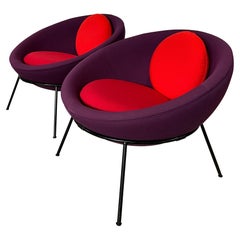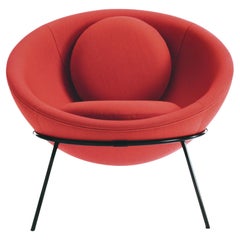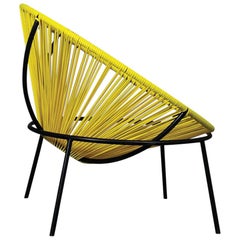Bardi Bowl Chair
Mid-20th Century Italian Mid-Century Modern Lounge Chairs
Steel
Recent Sales
Vintage 1950s Italian Mid-Century Modern Lounge Chairs
Stainless Steel
Vintage 1950s Brazilian Mid-Century Modern Armchairs
Iron
Vintage 1950s Brazilian Lounge Chairs
Metal
Vintage 1950s Brazilian Chairs
Iron
Bardi Bowl Chair For Sale on 1stDibs
How Much is a Bardi Bowl Chair?
Lina Bo Bardi for sale on 1stDibs
The Italian-born Brazilian architect Lina Bo Bardi came to imbue the pure and lofty if somewhat bloodless tenets of modern design with the warm and earthy character of her adopted homeland.
Bardi was born in Rome and graduated in 1939 from the Università degli studi di Roma “La Sapienza” with a degree in architecture. She moved to Milan, worked with Gio Ponti, among other modernist luminaries, and began a career in design journalism. Bardi served as an editor for Ponti’s groundbreaking magazine, Domus, and in 1945 traveled for the publication throughout Italy with a photographer, documenting the physical destruction wrought by World War II.
Bardi moved to Brazil in 1947 with her husband, art dealer and critic Pietro Maria Bardi. There Pietro helped establish the São Paulo Museum of Art (MASP) while his wife resumed her work in journalism and soon launched her architectural practice. Her first building project was designing a house for herself and her husband on a hillside in what were then the outskirts of São Paulo.
Built in 1951 and known as Casa de Vidro (or Glass House), it is a glass-walled box set on slim steel columns, inspired equally by the Bauhaus and Le Corbusier. Its interiors, with their mid-century furnishings, folk-art pieces and ethnographic curios, are reminiscent of those of Charles and Ray Eames’ house in California. (Bardi also created the interiors of the original MASP and was a natural choice to design the second museum when the institution had outgrown its first home.)
As a furniture designer, Bardi demonstrated flair from the start. The Bowl chair, designed in 1951 but not manufactured until Italian furniture maker Arper recently issued it, is a marvel of versatility. The seat can be swiveled to satisfy any attitude of repose or dismounted to serve as a rocking baby crib. That same year, she made the throne-like Bola de Latão chair, which in place of arms has stanchions topped by brass balls. Its slung leather seat and backrest have unfinished edges secured with lacing, giving the piece an artisanal, perhaps even sexual, air.
In the late 1950s and early ’60s, Bardi designed cushioned chairs with wooden frames whose softened angularity recalls the work of Pierre Jeanneret and Marcel Breuer’s 1938 furniture designs for Bryn Mawr College. But Bardi’s furniture construction and aesthetic sensibilities evolved in tandem with her populist principles. Her embrace of Brazil’s social mosaic was most fully expressed in her last major project, and her masterpiece: a combined cultural and recreational center in São Paulo known as the SESC Pompéia.
Built in stages between 1977 and ’82, the complex has as its core a renovated drum factory. In it, Bardi — to use architectural parlance — created a nonhierarchical environment, with equal prominence and care given to areas as disparate as theaters, sports facilities and places for old folks to sit and gossip or play chess.
Bardi’s last chairs, designed for the center, are built of solid wood, sturdy and durable with simple and graceful forms. They seem to suggest that the most interesting thing about a piece of furniture should be the person using it.
Find vintage Lina Bo Bardi furniture on 1stDibs.
Finding the Right Lounge-chairs for You
While this specific seating is known to all for its comfort and familiar form, the history of how your favorite antique or vintage lounge chair came to be is slightly more ambiguous.
Although there are rare armchairs dating back as far as the 17th century, some believe that the origins of the first official “lounge chair” are tied to Hungarian modernist designer-architect Marcel Breuer. Sure, Breuer wasn’t exactly reinventing the wheel when he introduced the Wassily lounge chair in 1925, but his seat was indeed revolutionary for its integration of bent tubular steel.
Officially, a lounge chair is simply defined as a “comfortable armchair,” which allows for the shape and material of the furnishings to be extremely diverse. Whether or not chaise longues make the cut for this category is a matter of frequent debate.
The Eames lounge chair, on the other hand, has come to define somewhat of a universal perception of what a lounge chair can be. Introduced in 1956, the Eames lounger (and its partner in cozy, the ottoman) quickly became staples in television shows, prestigious office buildings and sumptuous living rooms. Venerable American mid-century modern designers Charles and Ray Eames intended for it to be the peak of luxury, which they knew meant taking furniture to the next level of style and comfort. Their chair inspired many modern interpretations of the lounge — as well as numerous copies.
On 1stDibs, find a broad range of unique lounge chairs that includes everything from antique Victorian-era seating to vintage mid-century modern lounge chairs by craftspersons such as Hans Wegner to contemporary choices from today’s innovative designers.


